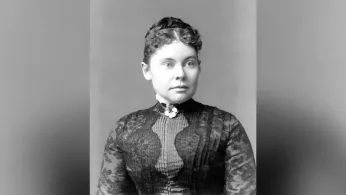
4 hours ago
Netflix’s “Monster” Returns: Season 4 to Explore Lizzie Borden’s Legacy and Queer History
READ TIME: 3 MIN.
Netflix’s Emmy-winning true crime anthology series “Monster,” helmed by creators Ryan Murphy and Ian Brennan, has begun production of its fourth season in Los Angeles. The new installment, officially titled “Monster: The Lizzie Borden Story,” follows the widely viewed “Monster: The Ed Gein Story” and continues the series’ tradition of dramatizing the lives of infamous real-life figures whose criminal cases have shaped American culture and legal history .
Returning star Charlie Hunnam, who led the Ed Gein season, joins Ella Beatty—cast as Lizzie Borden—in dramatizing the events surrounding the 1892 axe murders of Borden’s father and stepmother in Fall River, Massachusetts. The case, notable for its sensational trial and Borden’s eventual acquittal, has inspired countless retellings and cultural references, but this marks the first time it will be explored at the scale and depth of a “Monster” season .
Lizzie Borden’s story has fascinated the public for more than a century. In August 1892, the brutal axe murders of Andrew and Abby Borden shocked New England and quickly became national news. Lizzie, the youngest daughter, was arrested and tried for the crime. The trial, marked by intense media coverage and wild speculation, ended in her acquittal. Despite her legal exoneration, suspicion and legend continued to haunt her, cementing her as both a folk villain and a symbol of unresolved mystery .
The case has inspired films, books, stage plays, and a persistent nursery rhyme. Previous screen adaptations include the 2018 film “Lizzie,” which starred Chloë Sevigny and Kristen Stewart, exploring not only the murders but also Borden’s complex personal life .
Recent scholarship and artistic interpretations have increasingly examined Lizzie Borden’s life through a queer lens. Much of this discussion centers on her close, intense relationships with women—particularly actress Nance O’Neil, with whom Borden developed a deep bond in the years following her trial .
Historians have noted that Borden never married and lived for decades with her companion Ada Billiard, raising questions about her sexuality in a time when same-sex relationships were often hidden or coded . The 2018 film “Lizzie” explicitly depicted a romantic relationship between Borden and Bridget Sullivan, the family’s Irish maid, reflecting a contemporary interest in reclaiming queer histories that have long been erased or left ambiguous by mainstream narratives .
However, there is no definitive historical evidence confirming Borden’s sexual orientation. Surviving letters and accounts are suggestive but not conclusive, and scholars remain divided on whether it is appropriate to label her as a lesbian or queer by today’s standards. What is clear is that Borden’s life challenges the rigid gender and sexuality norms of her era, and her story holds a significant place in LGBTQ+ cultural memory as a touchstone for speculative representation and reclamation .
“Monster: The Lizzie Borden Story” arrives amid ongoing cultural conversations about representation, sensationalism, and the ethics of true crime entertainment. Previous seasons of “Monster”—which have depicted figures such as Jeffrey Dahmer, Ed Gein, and the Menendez brothers—have drawn both critical praise and controversy for their depiction of real-life violence and their impact on the victims’ families .
This new season offers an opportunity to reflect on the intersection of gender, sexuality, and justice in America’s legal history. The show’s creators, known for their engagement with LGBTQ+ themes in series such as “American Horror Story” and “Pose,” are well positioned to bring nuance and visibility to Borden’s story, inviting audiences to consider the queer subtexts that have long surrounded her legend .
Early reports indicate that the production is consulting with historians and LGBTQ+ advocates to ensure thoughtful, accurate representation . By foregrounding the complexity of Borden’s identity, the season could contribute to ongoing efforts to reclaim lost or marginalized queer histories and challenge simplistic narratives around infamous women in history.
With “Monster: The Ed Gein Story” recently breaking into Netflix’s global top 10 and the anthology’s previous seasons attracting tens of millions of viewers, expectations for the Lizzie Borden season are high. Fans and critics alike are keen to see how the show will balance true crime storytelling with sensitive engagement with Borden’s possible queer identity and enduring cultural impact .
As production continues, the series is poised to spark renewed dialogue around one of America’s most infamous murder cases and the lives of queer women whose stories have too often gone untold or misunderstood. Whether the new season will offer answers or deepen the mystery, “Monster: The Lizzie Borden Story” is set to be one of the year’s most discussed and debated TV events.






